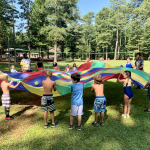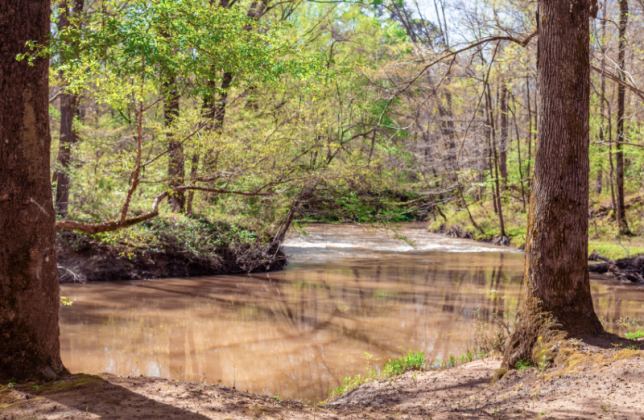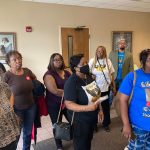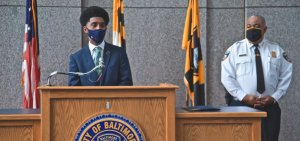By Haley Wilson
The Birmingham Times
Enter Camp Fletcher, a 300-acre woodland preserve in Bessemer, and find a hidden gem—a place where more than 800 kids from all backgrounds come to summer camp and participate in activities like hiking, canoeing, arts and crafts, team building, swimming, fishing.
But it’s much more than that.
“It’s an experience that young people from literally all walks of life remember for the rest of their lives and for all the right reasons,” said Dean Cowser, camp administrator. “While the positive atmosphere is entirely unforced, the path to that shared sense of respect and appreciation among campers is anything but accidental.”
Camp Fletcher was founded in 1926 by Pauline Bray Fletcher, the first African American registered nurse in Alabama, as an outdoor retreat for inner-city Black children and families to explore nature and the outdoors.
“In my opinion, she was way ahead of her time,” Cowser said. “She mortgaged her own home to purchase a plot and built six huts. … She bought 30 acres of land herself. Fletcher was truly dedicated to fulfilling her dream.”
The physical surroundings of the camp include a diverse range of birds, and flowers that are indigenous to the area, as well as a variety of trees, including tall, tapering pines with pinecones the size of pineapples. Sunshine and shade are in just the proper proportions. And “Big Shade Creek,” a rock-strewn creek bed with depth levels of three, five, and eight feet, flows freely.
“Fletcher is just a feel-good camp,” said La’Tanya Scott, education director with the Cahaba River Society and former camp counselor. “I first discovered Camp Fletcher one summer back when I was in college. … The energy here is so good. Kids really love the camp and learning, and you can tell. If I had a definition of what summer camp experience should be like, Camp Fletcher is it!”
In addition to basking in nature, campers each spend at least 30 minutes a day reading.
“We like to teach them everything, including the camp history,” said Cowser. “They may not understand the significance of the history now, but goal is for them to grow up and say, ‘Hey, when I was a kid, I spent time at a camp with history so ahead of it’s time, and I want to make that same contribution to the world.’”
That history is something Scott found intriguing.
“I really didn’t realize how interesting the history was until I got older and got into the [environmental education] profession I’m in now,” he said. “What Nurse Fletcher did for her community was groundbreaking and monumental.”
Fletcher’s Dream
When Fletcher arrived in Birmingham in 1906 from Huntsville, Alabama, to head the Birmingham Children’s Home for Negroes Hospital, she knew she wanted to make an impact.
In 1919, she was employed by the Anti-Tuberculosis Association as a county nurse and became convinced that underprivileged Black children needed an outdoor camp. With no such spaces established for Black children in Alabama, Fletcher became active in trying to get Birmingham citizens interested in sponsoring a camp for Black youth.
In 1924, she visited Camp Elwema in New York and, while on the trip attended a Graduate Nurses Association meeting. Upon the recommendations made at the convention, Fletcher reported her findings to nurses in Birmingham.
“[Fletcher] had a dream,” said Scott. “Her dream was that she wanted to bring children out into the woods. Get them out of Birmingham, out of the pollution into some fresh air to learn how to swim, to learn how to love nature, to not be afraid. She did that and she exemplified that in so many different ways.”
During Fletcher’s time, the camp was called Camp Margaret Murray Washington, in honor of the wife of Booker T. Washington, who, like her husband, was dedicated to educating and empowering people of color. In 1942, the name was changed to Camp Pauline Bray Fletcher because of Fletcher’s sacrifices to make the camp a reality.
Fletcher had an extensive list of local supporters, including the American Cast Iron Pipe Company (ACIPCO), Birmingham City Schools, renowned Birmingham businessman Arthur George “A.G.” Gaston, and the Delta Tau Chapter of Kappa Alpha Psi Fraternity, Inc., at Miles College.
“They all recognized a lack of opportunities for inner-city children to explore nature and the outdoors,” Cowser said. “Now, nearly 100 years later, kids can still learn from [Fletcher’s] example.”
Fletcher’s dream still lives today.
The nonprofit organization BridgeWays of Alabama runs Camp Fletcher. In the Summer Day Camp program, young people in grades one through 12 enjoy a broad range of experiences and challenges while making friends and spending time in the great outdoors, Cowser explained.
“Program hours are designed to accommodate parents’ work schedules, providing their children with enriching experiences throughout the summer,” he added.
Campers are divided by age or grade into small groups that are led by trained counselors, each of whom is carefully selected, is required to pass a criminal background check, and must undergo drug screening. Keeping the groups small enables counselors to know and respond to each camper as an individual.
“Mixed-into each activity is a learning opportunity for campers,” said Cowser. “Topics include environmental education, history, geography, math, science. It’s a technique we call ‘sneaky teaching’ because kids rarely ever recognize they’re being ‘taught.’”
BioBlitz
Next week at Camp Fletcher, the Cahaba River Society will host a BioBlitz on the banks of Shades Creek. On Friday, April 29, a Nighttime Species Survey of moth, bat, and amphibian species begins at 6 p.m. (limited overnight camping is available). The event continues on Saturday, April 30, from 9 a.m. to 6 p.m., with a Daytime Species Survey and community events, including storytelling, creative writing, and art sessions.
A BioBlitz, a term coined by a U.S. National Park Service naturalist, is an event that focuses on finding and identifying as many species as possible in a specific area over a short period of time. During these events, scientists, families, students, teachers, and other community members work together to get a snapshot of an area’s biodiversity.
“Connecting people to nature is essential to our mission at the Cahaba River Society,” said Scott. “Our work is driven by the conviction that every person has the birthright to clean water and to nature, no matter their circumstances or identity. That conviction was shared by [Fletcher] when she created Camp Fletcher for Black children who were being denied the experience of nature due to the unjust policies of segregation. We aim to honor Nurse Fletcher and her incredible legacy with this BioBlitz.”
There is no charge to attend or participate in any BioBlitz activity, but participants should register in advance at the Cahaba River Society website (cahabariversociety.org/event/camp-fletcher-bioblitz)
Camp Fletcher is located at 5150 Fletcher Rd., Bessemer, AL 35022. For more information, visit www.bridgewaysal.org.





























